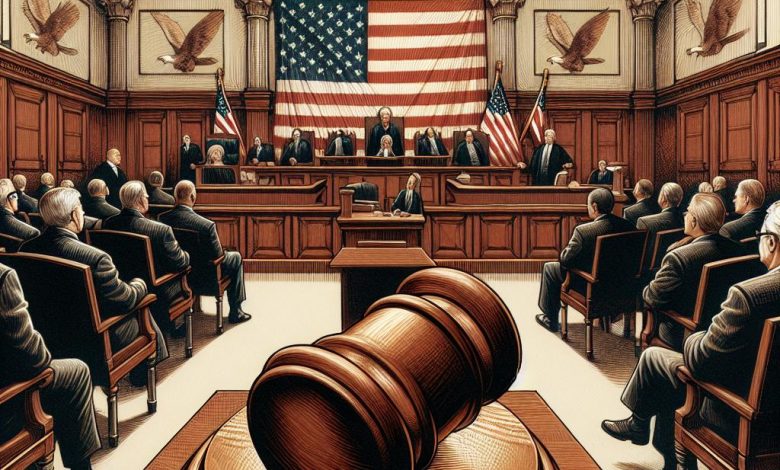
Table of Contents
Legal Distinction Affecting Trump’s Immunity
Civil Action for January 6, 2021, Capitol Attack
The U.S. appeals court in Washington, DC has delivered a decisive judgment regarding civil lawsuits that hold former President Donald Trump liable for the January 6, 2021, Capitol riot. This development has far-reaching implications, as it clears the way for lawsuits from Capitol police officers and Democratic lawmakers who seek to hold Trump accountable for the violence incited by his supporters—an effort aimed to overturn his 2020 election defeat. The unprecedented attack on the Capitol resulted in extensive damages and left nearly 140 police officers with injuries, as reported by their union.
Appellate Court Ruling on Presidential vs. Candidate Role
The court's unanimous decision introduces a crucial distinction between Donald Trump’s actions as a sitting president and those undertaken in his capacity as a presidential candidate. This delineation is pivotal, as the court highlighted in its ruling that while a president's acts to secure reelection are not officially presidential, they are personal in nature. Thus, while presidents enjoy a significant shield of immunity in the realm of official actions, the appellate court found that this does not extend to activities pursued as a candidate. When delineating between Trump’s presidential and campaign-focused activities, the court pointed to Trump’s own attempts to contest the election results, which he framed as a pursuit of personal interests rather than presidential duties.
Rejection of Absolute Immunity Claim
In disputing his liability for the Capitol riot incident, Trump asserted a claim for absolute immunity, contending that his speech to followers to "fight like hell" was an expression related to public concern and fell within his official duties. However, the court has unequivocally rejected this claim of absolute immunity. Trump's contention failed to persuade the court that his rally speech and call to action on January 6 were within the scope of his official presidential functions. Trump's lawyers have described the ruling as “limited, narrow and procedural,” maintaining that Trump’s conduct represented the interests of the American people. Nevertheless, the appellate court unanimously disagreed with the immunity defense.
Official-act Immunity and its Limitations
The concept of official-act immunity serves to protect a president from lawsuits for actions taken within the confines of official duties, granting the freedom to execute the responsibilities of the presidency without fear of personal liability. Yet, the appellate court's ruling clarifies that presidential immunity is not all-encompassing. Determining the boundary between official conduct and personal, unofficial activities is pivotal. According to the court, if a president were to engage in unofficial or private capacity conduct, he or she would be subjected to civil lawsuits like any other citizen. This acknowledgement by the court delineates the limitations of official-act immunity, establishing that when the president transitions into campaign mode, seeking reelection, the immunity that cloaks presidential actions dissipates.
Implications of the Court’s Ruling
Potential Increase in Financial Jeopardy for Trump
The appellate court's decision to reject former President Donald Trump's claim of absolute immunity carries significant financial implications for him. By delineating between the roles of Trump as a president and as a candidate, the court has placed Trump in a position of increased financial jeopardy. Now, he faces the prospect of civil lawsuits seeking compensation for alleged harms during the January 6 attack, potentially translating into substantial financial liabilities.
Possibility for Compensation Claims by Members of Congress and Capitol Police
The court ruling opens the door for members of Congress and Capitol police to pursue compensation for harms they endured as a result of the Capitol attack. The violent event left many officers with physical and emotional injuries and Congress disrupted in its duty to certify the 2020 presidential election results. With the panel affirming that Trump does not have immunity for actions related to his re-election campaign, plaintiffs now have a clearer pathway to seek reparations for their grievances.
Preliminary Stage in the Proceedings; Liability Not Yet Determined
The appellate court's ruling is a critical juncture in the ongoing legal discourse surrounding Trump's actions on January 6. However, it's important to note that this decision is at a preliminary stage of the proceedings. The central issue under consideration was immunity, not Trump's liability itself. The findings to date do not weigh on Trump’s guilt or innocence but allow the plaintiffs to proceed with their lawsuits. Future court developments are needed to fully determine Trump’s civil liability concerning the attack on the Capitol.
US Justice Department’s Stance on Presidential Protection
The US Justice Department, having been consulted on the matter, has previously outlined its position on presidential protection. They recognize that, while presidents are extended significant protection concerning their speech within a vast range of official matters, this protection does not extend to speech that incites imminent private violence. As such, the Justice Department’s stance reinforces the notion that Trump could face legal actions over the Capitol attack, carving out an exception to the general immunity typically afforded to presidents in the exercise of their official duties.
Separate Criminal Trial and Other Legal Challenges
Special Counsel-Led Federal Criminal Trial
Former President Donald Trump is set to face a meticulously scrutinized trial led by a special counsel investigating multiple criminal charges that represent some of the most severe legal challenges of his post-presidency life. This complex litigation process involves cases concerning allegations of Trump's interference with the 2020 presidential election and mishandling of classified documents. The level of prosecutorial rigor headed by the special counsel denotes the gravity of the allegations and the potential legal peril for Trump.
Allegations of Election Overturning and Retention of Classified Documents
Among the looming legal hurdles for Trump are serious allegations, including attempts to subvert the 2020 presidential election and improperly retaining classified government documents. The former is amongst the most consequential, as it directly encapsulates an affront to the democratic process and peaceful transfer of power. Trump's alleged engagement in a criminal conspiracy to overturn the election results is underscored by multiple indictments carrying an array of felony counts such as racketeering and forgery, as perceived notably in the sweeping state charges from Atlanta. Parallel to this are the charges for mishandling classified documents, an issue that independently ensnares the former president in significant legal strife.
Mike Pence’s Assertion of Advisers Pushing the Brink of Constitutional Crisis
The intricate layers of Trump's legal battles are further accentuated by the sentiments of key political figures such as former Vice President Mike Pence. Pence, while not linking directly to ongoing legal matters, highlighted in his remarks the pivotal nature of advisors' actions that reportedly pushed the United States to the brink of a constitutional crisis. The interplay of such personal insights with ongoing judicial proceedings emphasizes the profound constitutional implications of the matters currently being scrutinized in courts against Trump.
Timeline for Trial Commencement
The judicial proceedings against Trump are distributed over a timeline that extends into the 2024 presidential election period, potentially compounding the political landscape with unprecedented legal activities involving a past president who is also a presidential candidate. Specifically, Trump’s first trial related to the New York business documents is scheduled to begin in March 2024. The federal classified documents trial is granted a commencement date in May 2024, a point in time conspicuously close to the heart of primary season. These scheduling decisions bring forth a nexus of litigation and politics that promises to make the 2024 election season particularly turbulent.
January 6 Attack Details and Aftermath
Trump’s Speech and Actions During the Capitol Siege
The January 6 attack on the U.S. Capitol, which stands as one of the most harrowing episodes in American history, was precipitated by former President Donald Trump's speech exhorting his supporters to "fight like hell." Amid the chaos of the siege, while Congress was in session to certify the 2020 presidential election results, Trump's continued rhetoric and failure to swiftly and decisively call off the mob intensified the crisis. The subsequent bipartisan investigation laid bare the extent of Trump's involvement, painting a detailed picture of his unconstitutional and illegal efforts to cling to power, galvanizing profound scrutiny into his conduct and its alignment with the law.
Costs and Consequences of the Riot
The physical damages to the Capitol itself were matched by broader societal and democratic costs resulting from the insurrection. The Congressional certification process was obstructed, and the event's far-reaching consequences shook the nation's democratic foundations. It highlighted vulnerabilities within the electoral system, instigated a pervasive lack of trust among the American electorate, and underscored the dangerous influence of misinformation on political stability. A review of these costs has led to calls for reforms to safeguard the electoral process and uphold democratic norms.
Capitol Police Officers Seeking Damages
Capitol police officers, who bore the brunt of violence during the storming of the Capitol, suffered physical injuries and emotional trauma. These dedicated officers have filed civil lawsuits seeking damages from Trump as they contend with the aftermath of the attack. The gravity of these lawsuits is underscored by the appellate court's refusal to grant Trump immunity for actions taken outside the scope of his official presidential duties, thereby allowing the officers' claims to progress through the legal system.
Plaintiff Lawmakers’ Involvement and Responses
Congressional lawmakers who were present during the insurrection and who are now plaintiffs in related lawsuits were placed in a vulnerable position as they faced threats and violence. Their lawsuits argue for Trump's accountability in directing the assault and the infringement upon their roles as elected officials. The lawmakers’ responses and involvement in these suits demonstrate the high stakes when democratic practices are assailed, as they seek compensation not just for themselves but also for the broader implications for legal norms and representative government.




